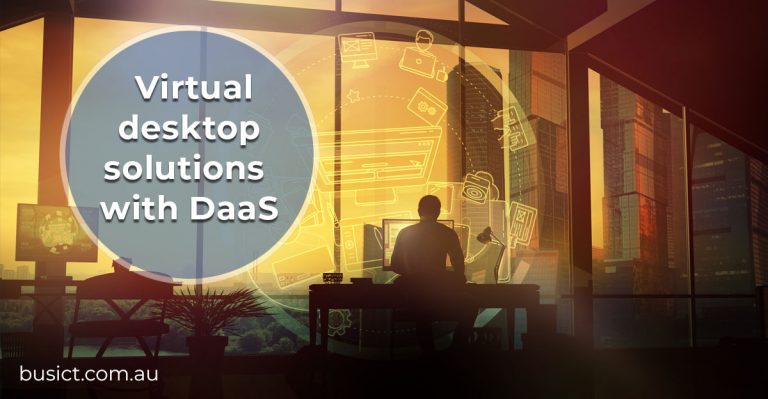Desktop-as-a-Service:
Desktops-as-a-Service or DaaS is a virtual desktop that securely facilitates virtual apps and desktops from Cloud to any location or device. Being a desktop virtualization solution, DaaS provides secure SaaS and legacy applications along with full Windows-based virtual desktops to your workforce, regardless of their location. DaaS works on a simple pay-as-a-go subscription model that is quite easy to scale up or down as per the requirements. This is a turnkey solution that can reduce the burden of the IT departments in organisations and significantly reduce overhead costs.
How Desktop-as-a-Service Works:
As the name suggests, DaaS delivers applications and services through a private cloud network while the users or the workforce can access those services and application though HTML-based web browsers or secure applications downloaded to a host system. In a nutshell, DaaS facilitates Virtual Desktop Infrastructure (VDI) through a private cloud service by purchasing, managing and upgrading the infrastructure. In addition, businesses that opt for DaaS, don’t have to worry about the digital infrastructure on their end.
Why DaaS Matters?
In today’s digitised corporate where remote working has become a norm, managed desktop services can prove to be extremely useful. In such a work culture, employees want to access their work from anywhere on their personal devices. On the other hand, companies look for a low-cost solution that can securely facilitate applications for getting the work done. Old-school PC solutions are often burdened with challenges such as managing and maintaining an IT department and personnel. With DaaS, everyday operations such as resetting passwords and/or updating security patches that impact user experience become easy. DaaS can also be quite a practical solution for businesses that prefer centralization, security and management of a VDI but also want the simplicity and excellence of highly professional service provider.

Here’s why DaaS has relevance in today’s remote working scenario.
- DaaS Improves Accessibility:
The ‘hosted’ nature of desktop-as-a-service makes it accessible from anywhere. This gives users (employees in this case) the freedom to scale the service as per their convenience giving them the freedom and flexibility to work as they please. - DaaS Reduces Costs:
DaaS works on a classic subscription model that will put an end to investment on the hardware, computer-related infrastructure, servers cost, licensing, etc. Such pay-per-use like subscriptions do not affect the assets of an organisation in any possible way and create a scope for more value addition. Similarly, DaaS also removes cost-related burdens that allow for streamlining and reallocating assets for reducing power and cooling costs and not to forget the heavy annual cost of the software/application that usually make up for vast amounts of money. - DaaS Improves Responsiveness:
Being quite dynamic, DaaS enables business organisations to respond to opportunities with agility. This is a great benefit for the organisations that are looking to scale up their operations. DaaS comes with rapid provisioning of virtual desktops and apps which allows organisations to be responsive and exploit opportunities at their will. - DaaS Improves Security:
Since DaaS delivers services virtually, it shifts the burden of maintaining security and protection from the device owner to the service provider who is using the data centre infrastructure. Such an infrastructure is designed for providing maximum security. As a result, data is never vulnerable on the device it is being used and regular backups are performed. These 2 being the fundamental levels of protection, data encryption techniques and multi-level authentication protocols are also used for enhanced security. - DaaS Induces Reliability:
Since DaaS providers hold a certain expertise in their work, it ensures high levels of reliability due to enhanced security measures, top-notch infrastructure and consistent performance. In addition, other factors contributing to such a reliable service module is the pay-as-you-go model of pricing that enables organisations in budget planning and forecasting.
Conclusion: Desktop-as-a-service comes with many benefits, especially for small businesses that often find it hard to procure expensive systems and software. However, it also comes with a number of challenges such as training the staff on how to use modified applications and systems, having enough internet bandwidth and backup and privacy issues that might occur with certain service providers. Although privacy issues are usually not the case with reputed service providers that follow internet security and privacy regulations, submitting your valuable data in the hands of an unregulated service provider may result in a disaster.
Managed IT services and managed desktop services provide by BUS ICT can help a business optimise the operation and administration to desktop deployment for improving efficiency and reduce downtimes. Small business IT consulting services offered by BUS ICT offers enhanced Small business IT support Melbourne to the end-users, so when you handover your managed desktop service, you can relax as we will take care of everything from installation to support.

